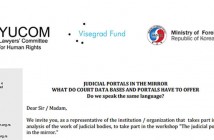Pease, Women, Security, Human Rights Defenders (November, 2008)
The conference Women, Peace, Security was organized by Women in Black and Lawyers’ Committee for Human Rights with the aim to raise awareness about the issue of security of women and women human rights defenders, as well as to discuss instruments for their protection – Resolution 1325 and the so-called UN Declaration on Human Rights Defenders.
The conference was held at the Centre for Cultural Decontamination on October 30th 2008, one day before the Resolution 1325 Day, which was marked by women human rights defenders by visiting the People’s Assembly of the Republic of Serbia.
October 30th 2008
CONFERENCE
Women, Peace, Security
Organized by: Lawyers’ Committee for Human Rights (YUCOM) and Women in Black
The conference: Women, Peace, Security, held at the Centre for Cultural Decontamination was attended by female representatives of nongovernmental organizations, unions, political parties, as well as representatives of central, regional and local authorities from all of Serbia.
In an opening word, Staša Zajović, Coordinator of Women in Black, pointed out the fact that the taxpayers’ money was often used to finance death. She stated that women suffer the greatest burden of militarism, and war is the primary cause of their poverty. YUCOM Chairwoman Biljana Kovačević-Vučo noted that Serbia adopts declaratory laws which are not implemented and that the system we live in still has to make a discontinuity with the Milošević era values. She reminded the panelists of the recent attacks against Sonja Biserko, which directly jeopardized Biserko’s life.
After the introduction, Ministry of Justice representative Gordana Pualić expressed her support of the initiative by Women in Black and YUCOM, stating that the implementation of Resolution 1325 and the Declaration on Human Rights Defenders will be supported by the Justice Ministry.
The session: From a traditional to a humane concept of security – global and regional level featured the following panelists: Prof. Vesna Rakić – Vodinelić (CUPS), Prof. Dragana Dulić, Faculty of Civil Defense in Belgrade and Snežana Tabački, Women in Black.
Women are the greatest victims of jeopardized security, Vesna Rakić-Vodinelić said. They make up the largest number of civilian victims and refugee population and are exposed to rape. Women have much more difficulties than men getting resources which could save them, such as food, services, and financial means. Dragana Dulić from the Faculty of Civil Defense emphasized that Serbia does not have an orientation toward the notion of human security, which is a salutary idea and a concept that needs to be defended by women unreservedly.
Panelists of the session: State of security in Serbia: obstacles, reforms, challenges… included: Verica Barać (Anti-Corruption Council), Rodoljub Šabić (Commissioner for Information of Public Importance) and Jelena Milić (Director of the Centre for Euro-Atlantic Studies).
Jelena Milić expressed her standpoint that “the issue of security is hostage of the policy on Kosovo”. She stated that Serbia is perceived as source of insecurity in the region, and the cases of the soldiers’ murders in Topčider and Leskovac was still in an obscure phase of the investigation. Verica Barać pointed out that institutions in Serbia are not functioning, in spite of good laws, which is mostly the consequence of a lack of political will to suppress corruption in Serbia. Corruption represents a danger to the security of the entire society and it will exist until there is an inconstant use of the State Audit Law and irrational omissions in using developed resources of institutions which are capable to combat corruption. Information Commissioner Rodoljub Šabić stated that the new Personal Information Protection Law restricts his authority, proving mistrust by the political elite when it comes to independent institutions which are supposed to provide protection of human rights. He urged all human rights defenders to continue to persistently advocate the idea of complete respect of the principle of public government transparency in accordance with reached standards in the international community, which directly contributes to the improving of individual security.
A presentation of the Resolution 1325 and Declaration on Human Rights Defenders and the previous activities of Women in Black and YUCOM in the raising of awareness on the necessity of the said documents’ implementation, was followed by the session: Security of activists and human rights defenders in Serbia with panelists: Biljana Kovačević-Vučo (YUCOM), Boban Stojanović (Queeria), Zoe Gudović (Women at Work and Queer Belgrade) and Maja Stojanović (Youth Initiative for Human Rights, Niš).
Biljana Kovačević-Vučo pointed out numerous aspects of jeopardized personal security of human rights defenders, calling on the panelists to react to such attacks by organizing and expressing their solidarity with victims of lynch by the authorities and illegal neo-Nazi organizations. Queeria activist Boban Stojanović found confirmation that we live in a deeply criminalized society a few days ago when a pet store saleswoman recommended him to buy the same brand of cat food which was purchased by Legija’s daughter. He stated his opinion that, by permitting an anti-fascist protest in which Stojanović did not participate, Dačić washed his hands and “it seems as though Dačić will allow a Gay Pride rally”. Zoe Gudović, activist of Queer Belgrade and Women at Work, spoke about attacks against participants of the Queer festivals in Belgrade and Sarajevo, describing the attackers as fascist aged between 18 and 22. She expressed her disgust with the fact that society always shows understanding for them, reminding that hatred unites those who aim to destroy somebody who is different. Maja Stojanović from the Youth Initiative for Human Rights in Niš stated that the majority of citizens have the idea of their security, and that they feel safe because they keep silent. She remembers September 24th for the news about the Open Day of the Army of Serbia and the children who shot from firearms, later describing it as the most interesting day of their lives. She also mentioned the case of the Philosophical Faculty of Niš where a panel discussion which denied genocide in Srebrenica was allowed.
The session: What is security for women? On the antimilitaristic-feministic concept of security included the following panelists: Nevena Kostić, Leskovac (Women for Peace/Women in Black Network), Aida Ćorović (Urban In, Novi Pazar) and Staša Zajović, Women in Black.
Aida Ćorović, Chairwoman of the Urban In NGO from Novi Pazar stated that she feels like a second rate citizen in the city and the country she lives in. The state’s attitude towards citizen of Bosniak nationality, a very strong influence of Sulejman Ugljanin , division between Muslims – those are only some of the problems she addressed. She expressed her belief that a greater level of solidarity with woman from provincial areas is necessary…
All participants of the discussion agreed that solidarity is one of the key instruments for the protection of women human rights defenders, as well as an instrument for exerting pressure on the state to adopt documents and develop institutions which will guarantee security for women and the society as a whole.
************************************************************************************************
October 31st 2008
RECEPTION AT THE PEOPLE’S ASSEMBLY
Women in Black and YUCOM representatives spoke with Peoples’ Assembly deputies about the implementation of Resolution 1325 and the UN Declaration on Human Rights Defenders.
On the occasion of Day of the Security Council Resolution 1325 for the establishing of conflict solving mechanisms based on gender equality, parliament deputies Snežana Stojanović-Plavšić, Elvira Kovacs and Nikola Novaković (Deputy Speaker of the People’s Assembly) received representatives of nongovernmental organizations Women in Black and YUCOM at the People’s Assembly on October 31st 2008.
After years of unsuccessful submitting of the Resolution 1325 by Women in Black and YUCOM to the Parliament’s consideration, for the first time there were talks at the meeting about the importance of participation of women in mechanisms which guarantee the security of citizens (of both sexes) of Serbia and a foundation was established for the cooperation between the nongovernmental sector and parliamentarians in the realization of the Resolution’s demands.
At the same time, members of Parliament were acquainted with obligations from the UN Declaration on Human Rights Defenders and urged to protect women human rights defenders, by adopting the Declaration as well as to take part in other ways in the promotion and protection of human rights.
************************************************************************************************
Belgrade, November 2008
Katarina Jozić
Lawyers’ Committee
for Human Rights (YUCOM)




